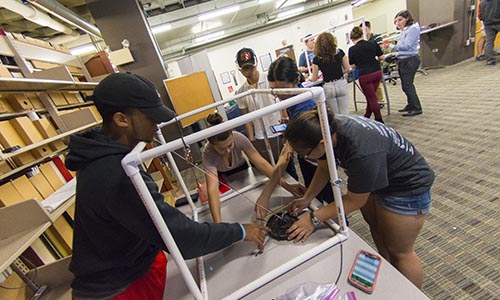Bachelor's Degree in Civil Engineering
As a student pursuing a degree in civil engineering, you’ll master and apply the fundamentals and be able to specialize in your chosen field. Be immersed in protecting the earth’s air and water, in the engineering behavior of earth materials, or in finding better ways to move people and goods. Examine the space where the natural world and the urban environment meet, or come to understand the complexities of and impact the future of construction practices. Whatever your path, WPI’s project-based learning approach guarantees hands-on experiences. You’ll build leadership and cultivate ingenuity, typically in collaboration with industry partners and always with the support of faculty advisors.


The WPI Way
If you’re interested in a Civil Engineering degree at WPI, discover our award-winning faculty, cutting-edge research, and world-changing projects, along with the inspiring accomplishments of our alumni.
Pursuing your degree in civil engineering at WPI lets you chart your own course by studying broadly or focusing your studies with these specializations:
- Structural and Geotechnical
- Environmental
- Transportation
- Urban and Environmental Planning
- Construction Engineering and Project Management
No matter what you choose, you’ll take courses across civil engineering’s fields of study, like Resilient Infrastructure for a Changing Climate, Legal Aspects of Professional Practice, Soil Mechanics, and Traffic Engineering.
You can also pursue your bachelor’s and master’s degrees concurrently with the Civil Engineering BS/MS program.
Complementary Minors:
Project-based Learning
Hands-on, project-based learning is the cornerstone of the WPI experience, and a big reason why you’ll stand out to employers. As a Civil Engineering major, your options might include supporting faculty research, conducting projects off-campus in the U.S. or abroad, and finding your niche.
More Value
Whether it’s real-world work experience through a co-op or internship, accelerating your path with a BS/MS program, or even finding opportunities to integrate coursework with extracurricular interests, personalizing your education at WPI pays off. See how WPI changes your path.
Blend Civil & Chemical Engineering with a Degree in Environmental Engineering
Are you passionate about both civil and chemical engineering? With a degree in environmental engineering, you can combine your interest in both areas, tailoring your degree to your specific interests and goals, and gain the foundation to forge your path in an in-demand field. Students work closely with faculty in environmental, civil, chemical, and mechanical engineering to learn about subjects like sustainability, reducing chemical toxicity, and keeping water supplies safe.
Focus on the Science & Engineering Aspects of Building Design
Interested in the fundamentals of engineering and their application to buildings? Consider a degree in architectural engineering from WPI, one of the few ABET-accredited programs in the U.S., and the only one in New England. You’ll gain expertise in structural systems, electrical systems, construction management, and more. If you want a broader knowledge of this emerging field, consider a minor in architectural engineering instead; it’ll give you the chance to learn about buildings and their functionality, design, and energy efficiency.
Focus on Chemical Processes with a Degree in Chemical Engineering
Maybe you’re interested in a number of disciplines, everything from engineering, biology, and chemistry to biomedicine and physics. With a degree in chemical engineering, you’ll use skills from them all to solve the world’s most complex problems, going beyond the classroom to make discoveries in areas like environmental protection, life sciences, and much more.
